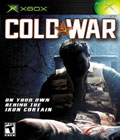Genre: Stealth/Action
Publisher: Dreamcatcher
Developer: Mindware Studios
Release Date: September 27, 2005
The "stealth" genre has steadily been growing in popularity over the past several years. Metal Gear Solid invented it back in 1998, Splinter Cell perfected it in 2002, and later iterations of these two series have refined the formula to near-perfect proportions. Predictably, a slew of imitators (Spy Fiction, Stolen) rose up to steal some thunder from the giants, usually with less than stellar results. Cold War (not to be confused with Cold Winter, the criminally underrated PS2 shooter) is one of these imitators; it gets a couple of cool things right, and a whole lot of stuff wrong.
The year is 1986. Miraculously, animosity between global superpowers the Soviet Union and the United States is at an all-time low, and for the first time, some dare to hope that the Cold War may be ending, that the constant threat of World War III looming over the world may be receding. Unfortunately, not everyone is happy with the recent turn of events.
Forces within the Soviet government, led by the head of the KGB (Russia's secret police), do not want sunny relations between the two countries. As a last ditch effort, they decide to frame an innocent American as a CIA assassin, shattering the Russian president's faith in U.S. goodwill and returning the Cold War to full swing. Barinsky, the KGB boss, has the perfect guy in mind to take the fall…
Enter Matthew Carter, American journalist extraordinaire. He's created quite a name for himself as a guerrilla reporter, sneaking in and out of restricted areas to catch a scoop, breaking confidential stories, and generally being a thorn in the side of the people in charge. Carter is tipped off by an informant that a secret meeting is taking place in Moscow. Carter takes the bait, and is set up by the KGB. On the run from sinister forces, our hero must clear his name, and more importantly, get out of Russia alive.
Awesome plot, no? If only I could stop here, and we all could pretend there's nothing else to talk about, Cold War could be a triumph of gaming. Unfortunately, the slick story is dragged down by the actual game.
Let's begin with the hero himself. Regardless of how tough he is, or how many corrupt governments he's toppled, Matt Carter is a geek. Just look at the guy: boring haircut, dull facial hair, even the prerequisite nerd glasses are all present and accounted for. As a journalist myself, the inherent dorkiness of the main character caused me to dock Cold War a few points. Yes, it's nice to have a realistic protagonist that isn't a muscle-bound secret agent, but most of us don't play video games to rigidly stick to reality. Some of you may recall that a good number of classic NES games involved saving the President from robot ninjas armed with poorly translated space kung-fu.
The graphics are a mixed bag. Awesome cel-shaded cut scenes move the story along nicely (although there's no animation whatsoever; they're just slideshows of still pictures). When gameplay begins, though, look out. Visuals range from merely passable to an ugly disaster.
Cold War's voice acting reminded me of an old game called Resident Evil, back on the PS1. Leafing through to the back of the instruction manual, I was shocked to discover that I had no clue who any of the credited voice actors were. (Okay, maybe I was a bit harsh with the RE comparison, but come on.) Cold War easily contains some of the cheesiest acting I've heard in years; everyone took their roles way too seriously.
Additionally, the ridiculous Russian accents added an unintentional dose of hilarity to the game. (Would it have killed Mindware to hire a bunch of Russian-speaking guys to do a bit of voice-over work?) Also, and this is a complaint I have with many games nowadays, why don't the subtitles match the dialogue on occasion? Did the characters decide to ad-lib out of nowhere? Don't professional programmers check their work?
Like the graphics, Cold War's controls are hit-or-miss. Carter borrows Sam Fisher's "action button" system, where your A button controls various context-sensitive actions. Opening doors, searching bodies, even performing stealth knockouts are as easy as pressing one button. However, Carter's glacial walk speed makes getting around a chore, and his easily depleted sprint meter means you'll be walking a lot. Easy-to-use menus grant you quick access to any weapon or gadget you possess, and the over-the-shoulder view that the camera assumes when Carter draws a weapon works surprisingly well.
The meat-and-potatoes of Cold War is the stealth-ish gameplay. I use the term "stealth-ish" because, for all the sneaking around you'll be doing, there's a fair amount of gunplay involved. Guards are as dumb as bricks; just like Manhunt, an enemy could stand right in front of you, and as long as you're safe in a shadowy corner, they'll never see you. Your stealth meter is confusingly designed; both noise and visibility are measured by the same bar, making it difficult to gauge just how noticeable you really are. Guns are freely available, and ammo is plentiful. Stealth's main purpose in Cold War is to set up a proper ambush, not to go completely unseen like other, better-executed sneaky games. If a baddie does see you, though, you'd better have a quick draw. Two bullets and you're dead, and the awkward controls make healing a frustrating task.
I've been really critical of Cold War so far, but it doesn't fail entirely. An innovative "assembly" system is the closest I've seen any video game come to harnessing the mullet-enhanced genius of everyone's favorite '80s TV crime fighter, MacGyver. Matt Carter is no MacGyver, let's get that straight. MacGyver could completely destroy an enemy base with nothing but a physics textbook, a tampon, and a stick of gum. Carter is limited to picking up various junk he finds throughout the levels to jerry-rig useful gadgets. These combinations range from ludicrous (how exactly do you make rubber bullets out of a plastic bottle and a handful of ammo?) to ingenious (Carter can set up improvised traps to take out nearby guards). By finding folders scattered through the stages, Carter earns tech points used to unlock new inventions. Easily the coolest part of the game, bar none.
Cold War's most oft-mentioned feature is the X-ray camera. The main piece of evidence against Carter is a high-tech camera planted on him by the KGB. The joke's on them; the device gives Carter a key advantage against the conspiracy unfolding before him. The camera allows our hero to see through walls, of course, but it also reveals the scanning area of cameras and indicates hostiles with bright red guns clutched in their skeletal hands. The X-ray camera is also capable of firing a beam of energy that can subdue foes, as long as you hit them in the brain with it. Putting aside obvious concerns about the amount of radiation such a device would put out, and why the KGB would entrust such an awesome piece of technology to an enemy of the state, it's clear that this was intended to be the centerpiece gimmick of the game.
Unfortunately, as imaginative as the X-ray camera and creative gadgets are, they simply cannot make up for Cold War's countless missteps. Lacking the production value and sustained excellence of the Metal Gears and Splinter Cells of the world, Cold War is doomed to rot in obscurity on the clearance shelf of your local game store. Give it a rent if you're hankering for a new, briefly entertaining stealth experience, but don't expect the successor of Solid Snake and Sam Fisher.
Score: 6.2/10
More articles about Cold War












 Cold War follows the story of Matt Carter, a freelance journalist, who finds himself in the midst of an international conspiracy that aims to control the U.S.S.R. Twelve hours after arriving in Moscow for a routine story, Carter has been stripped of all his possessions, beaten unconscious and thrown into the KGB's political prison. Using only recovered weapons and improvised gadgets, he must now evade or overcome elite Soviet forces and defeat the conspiracy before he is sent to a Siberian prison camp or killed.
Cold War follows the story of Matt Carter, a freelance journalist, who finds himself in the midst of an international conspiracy that aims to control the U.S.S.R. Twelve hours after arriving in Moscow for a routine story, Carter has been stripped of all his possessions, beaten unconscious and thrown into the KGB's political prison. Using only recovered weapons and improvised gadgets, he must now evade or overcome elite Soviet forces and defeat the conspiracy before he is sent to a Siberian prison camp or killed.











































